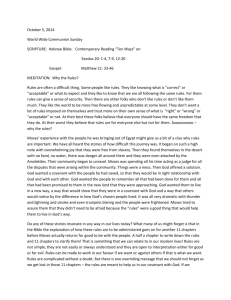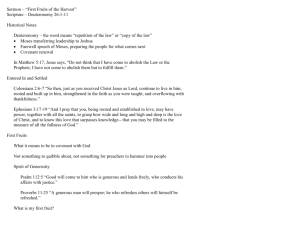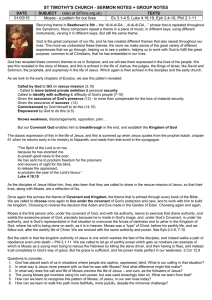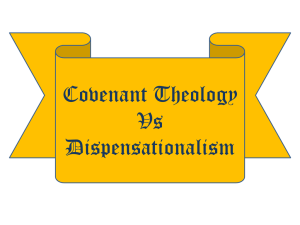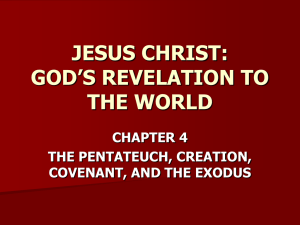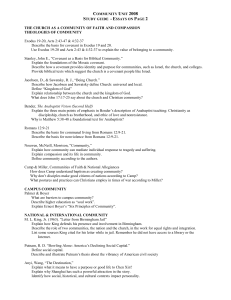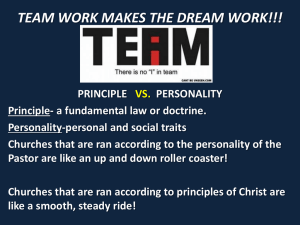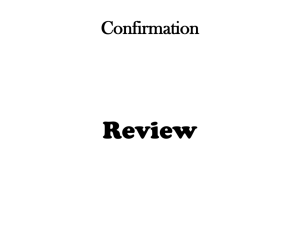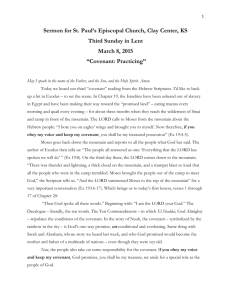The-Journey-Bible-2-Week
advertisement
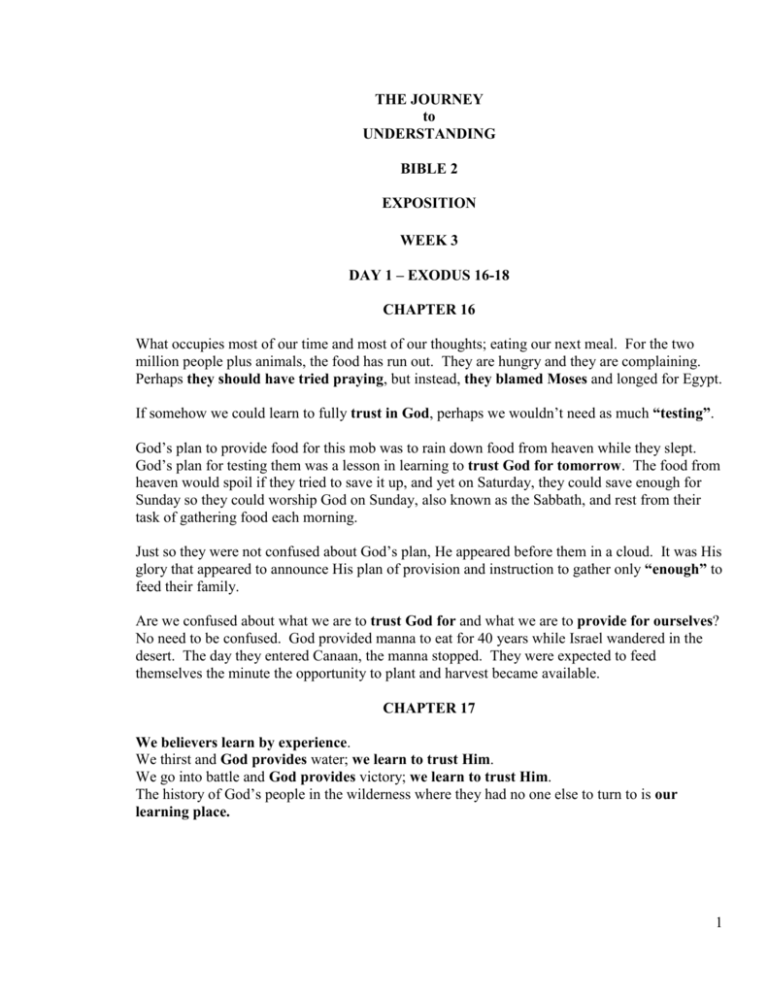
THE JOURNEY to UNDERSTANDING BIBLE 2 EXPOSITION WEEK 3 DAY 1 – EXODUS 16-18 CHAPTER 16 What occupies most of our time and most of our thoughts; eating our next meal. For the two million people plus animals, the food has run out. They are hungry and they are complaining. Perhaps they should have tried praying, but instead, they blamed Moses and longed for Egypt. If somehow we could learn to fully trust in God, perhaps we wouldn’t need as much “testing”. God’s plan to provide food for this mob was to rain down food from heaven while they slept. God’s plan for testing them was a lesson in learning to trust God for tomorrow. The food from heaven would spoil if they tried to save it up, and yet on Saturday, they could save enough for Sunday so they could worship God on Sunday, also known as the Sabbath, and rest from their task of gathering food each morning. Just so they were not confused about God’s plan, He appeared before them in a cloud. It was His glory that appeared to announce His plan of provision and instruction to gather only “enough” to feed their family. Are we confused about what we are to trust God for and what we are to provide for ourselves? No need to be confused. God provided manna to eat for 40 years while Israel wandered in the desert. The day they entered Canaan, the manna stopped. They were expected to feed themselves the minute the opportunity to plant and harvest became available. CHAPTER 17 We believers learn by experience. We thirst and God provides water; we learn to trust Him. We go into battle and God provides victory; we learn to trust Him. The history of God’s people in the wilderness where they had no one else to turn to is our learning place. 1 CHAPTER 18 For the romantics, the Bible leaves us empty here because nothing is recorded about the reunion of Moses and his wife. The reunion with Jethro the priest provides an important framework for governance of the people. Where there are people, there are disagreements and through the advice of Jethro, Moses established a system to deal with problems. DAY 2 – EXODUS 19-20 Our God is a covenant making God who keeps every promise of every covenant. Some of the covenants are CONDITIONAL upon the RESPONSE of His people. The Mosaic covenant is conditioned upon OBEDIENCE to His voice and the keeping of their promise to God. No man or woman can look upon God and live. His presence and His holiness is too powerful. When God initiated His law and His covenant, He visited the mountain inside a thick cloud. The people were forbidden to even TOUCH the mountain. Only Moses and Aaron were allowed to ascend the mountain where God is to appear inside a thick cloud to verbally proclaim His commandments to the people. The presence of God was accompanied by envelopment of Mt. Sinai in a thick smoke that rose to the heavens. The mountain shook as in an earthquake accompanied by thundering, lightning, and a loud trumpet. The people trembled as they stood at the base of the mountain in awe of God’s presence. THE TEN COMMANDMENTS This is what the mighty God says: 1. “I am the Lord your God and you shall have no other gods before me.” 2. “You shall not make for yourself any carved image.” 3. “You shall not take the name of the Lord your God in vain.” 4. “Remember the Sabbath day to keep it holy. Six days shall you work and on the seventh you shall do no work.” 5. “Honor your father and mother.” 6. “You shall not murder.” 7. “You shall not commit adultery.” 8. “You shall not steal.” 9. “You shall not bear false witness against your neighbor.” 10. “You shall not covet (anything your neighbor has).” DAY 3 – EXODUS 21-23 God’s laws are specific and are the basis of many of our civil laws today. We do well to live by them and so please God. We are not justified by them, however. We are justified by God’s shed blood on the cross. 2 Jesus made a new covenant with us fulfilling the requirements of the law. Jesus makes it clear that the law does not pass away but continues. Since no one could ever fulfill all the requirements of the law, Jesus fulfilled them for us; imputing righteousness by His acts of sacrifice. DAY 4 – ACTS 5 The favorite argument of sinners in defending their life style is hypocrisy on the part of professing Christians. As believers, if we can do nothing else, at least we can be real. If we try to impress others with our benevolence or giving, it is perhaps worse than doing nothing at all. Many in the early church were giving all they had to the cause of Christ. Along came Ananias and Sapphira with intent to deceive fellow believers with their giving. Surely God knows everything we do and think. It is a fearful thing to try to deceive God who is angered by any false pretense. The early Christians faced hostility that 99% of us have never even heard of. Not only did they have the opposition of the world, they had the opposition of the organized religion of their day. They met regularly on Solomon’s porch at the temple. Those who heard them didn’t dare join them (Acts 5:13) because they would be banned from their organized religion; and yet they were highly regarded and the church was growing daily as people were being saved. The apostles performed so many miracles that people began to bring the sick on beds to be healed just by Peter’s shadow. Crowds gathered wherever they went. When I think of the puny excuses that believers offer today for not serving God, I hang my head in shame. You want to hear a real reason: “They’re going to beat me and throw me in prison.” You want to know what happened? During the night, angels opened the jail doors and the next morning they were right back in the temple teaching and ministering. When the so called leaders sent people to the jail to find them, the jail was empty. When they couldn’t find them in jail, they found them in the temple doing the work they were called to do. The so called leaders were furious. They wanted to kill them, but calmer heads prevailed. They warned them against teaching, had them beaten, and let them go. They rejoiced at being counted worthy to suffer for the name of Jesus. DAY 5 – ACTS 6 The first church board consisted of seven people chosen because they were full of the Holy Spirit. Their job was not to be advocates or representatives of the people. Their job was to assist the apostles and serve the people. The most outstanding board member was Stephen who had a grasp of God’s Word and was full of God’s grace and power. He did great wonders and miraculous signs in the face of opposition by religious groups. When seized by the Sanhedrin, they produced false witnesses against him, and yet when confronted, they saw a man so filled with the Holy Spirit that his face was like the face of an angel. 3
